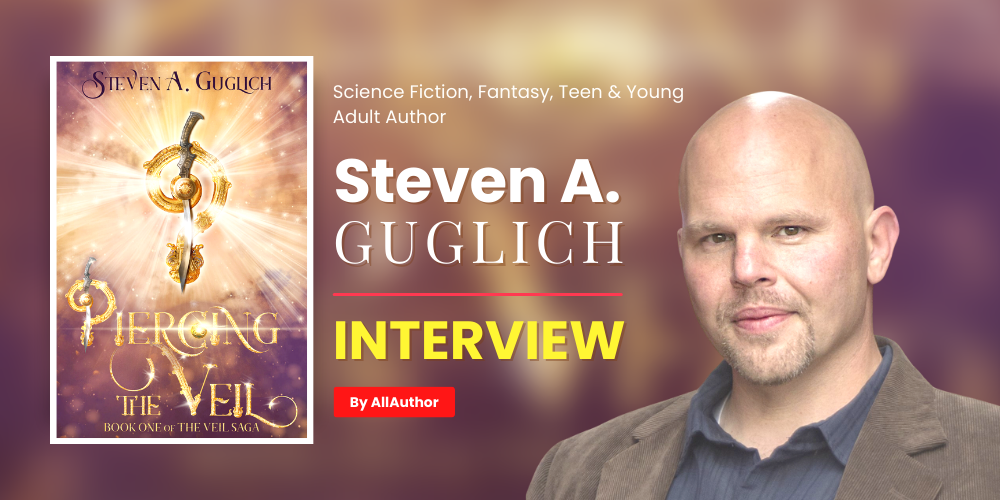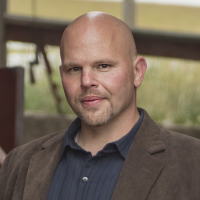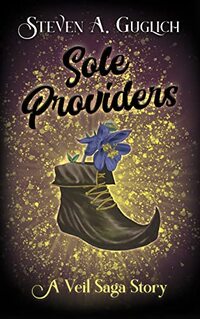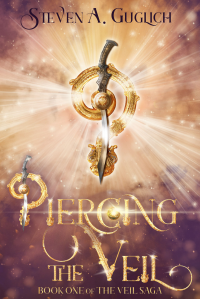Steven A. Guglich Interview Published on: 09, Jun 2023
 What was your childhood like?
What was your childhood like?
I've been "adventuring" on fantastical worlds ever since I could remember. My way of dealing with things was to escape into my own imagination. My Dad was always a big fan of sci-fi and fantasy, and he had books, games, and calendars from those genres all over the place. And when we discovered Dungeons & Dragons in the Summer of 1981, visiting strange new worlds took on a whole new aspect.
Were your family ever skeptical of your dreams of writing? Who has been your greatest supporter?My family has always been supportive of anything I wanted to do. My Dad was probably my biggest supporter growing up. He seemed to think I could do anything, and when I didn't take the chance, that's when he'd be disappointed in me. In my freshmen year of high school, I had the wild idea to join the school newspaper and try out for the football team. In the end, I decided to only join the newspaper because I didn't think I had a chance to make the football team. My Dad was disappointed in me. Not because I didn't make the football team, but because I didn't try. I lived most of my life having unfulfilled dreams, always being afraid to try, even with my Dad's encouragement. But it wasn't until I got married and my wife became my biggest supporter, encouraging me to find time to write and fulfill my dream of becoming an author that I actually started making writing a daily habit. After 15 years of marriage, four kids, and a move from New Jersey to North Dakota, my first book was published on March 31st, 2023.
Who are your biggest influences in science fiction and fantasy, and how have they impacted your writing?Growing up, I loved Piers Anthony's Xanth and Incarnations series, F. Paul Wilson's LaNague Chronicles and Repairman Jack Series, and Terry Brooks Magic Kingdom series. Most recently I have been inspired by the works of Brandon Sanderson. His creativity when it comes to world building has caused me to take my world building to the deepest levels, creating entire cultures that seem real.
What is your creative process for developing new worlds and characters?I'm what I consider to be, a Deep World Builder. Story is very important, and usually I'll start with an idea for a story. But that story has to take place somewhere and the characters need to come from somewhere. I enjoy creating those places and starting out with the ancient history and working my way up to the time in which the story takes place. Answering the questions of: "Why do these people behave the way they do?" "What environmental influences shaped their beliefs?" And, "How have those beliefs changed over the time period that this culture has existed?" To me this is where most of the fun in writing comes from. Most of the writing I did for The Veil Saga was world building, creating a racial profile for each of the enchanted races, a bestiary, and a Secret History including a comparative history time line spanning thousands of years that shows events that occurred at the same time for each of the races.
How do you balance scientific accuracy with storytelling in your work?Ah! Realism in fantasy is so important to me. That's a characteristic of deep world building. You're creating something so fantastic, but your making it believable. Scientific principals govern everything, and their must be principals on how the fantastic works too.
How did you go about creating the magic system in your book, Piercing the Veil? Was it influenced by any existing mythology or folklore?Magic in the world of "The Veil Saga" is based on the scientific theory of zero point energy and certain concepts in quantum mechanics. It takes the concept a bit further and imagines that enchanted races have a physiological ability to harness and even conduct and manipulate the very energy that surrounds molecules and holds them together. In doing so these enchanted beings, elves, gnomes, etc., can do seemingly magical things like healing, creating blasts of energy, walking through walls, and manipulating the physical aspects of things. Species are classified as bioelectrical beings and biomagical beings. Humans are bioelectrical an therefore do not have the ability to manipulate magic. Elves are biomagical and have the highest potential do manipulate magic.
Can you talk about any particular scenes or plot points in your book, Piercing the Veil that were particularly challenging to write, and how you tackled them?Overall, The Veil Saga, has been challenging to write because I put myself to the task of creating origin stories for mythological events and beings that are familiar to most people. As I stated earlier, I am a deep world builder. But, in The Veil Saga, the world was already built! It's our world, Earth, in our day and time. So, I had to research all the myths and legends I was borrowing from and fill in the rest to create a believable story. And I had to develop the cultural an racial aspects of beings such as elves, dwarves, and gnomes and imagine what they would be like if they existed in this day and age, all the while sticking to the typical notions of these beings found in folklore, mythology, and legend.
How did you go about creating your character, Jeremy Goodson? Did you base him on people you know, or did he come purely from your imagination?Jeremy Goodson is one of the main characters in Piercing the Veil: Book One of The Veil Saga. He was created to be the atypical hero; the ordinary guy with no skills and abilities who finds himself in the middle of a physical and political battle from groups of people he never even knew existed. In many ways he's a conglomeration of me and my friends who grew up as geeks and nerds, always wanting to be the hero and secretly knowing inside that we didn't have what it takes to be the hero. That's where Jeremy's battle comes in. I took the opportunity to take someone I identified with and place him in a circumstance that was way beyond his temperament and skill set and see how he would react.
How do you balance character development with advancing the plot, and do you find this challenging?I believe that stories need to be character driven. Readers don't necessarily need to identify with a character, but they need to connect in some way; either they are rooting for him because he's a good guy or he's so bad that you just can't wait to see what he does next, hoping in the end he'll get what's coming to him. I balance character development and plot development by writing from the third-person-limited POV. This way readers can get inside one person's head and watch as they advance through the plot.
How do you approach world-building in your stories, and what elements do you prioritize?I pretty much answered this question as part of the answer to other questions. Let me know if you'd like me to go into even more detail.
How has the science fiction and fantasy genres evolved over time, and where do you see it going in the future?As technology develops, so do new ideas. What was once fantastic, is now common place. Who would have ever thought that, as a kid watching Star Trek, we'd all have our very own communicators one day? As writers of science fiction and fantasy we borrow not only from the discoveries of the past, but also of the present. Where is this genre going in the future? We are only limited by our imagination.
How do you handle criticism or negative reviews of your work, and what advice would you give to other writers struggling with similar experiences?Good, constructive criticism is easy to take. And like any advice you get, you spit out the bones and you chew on the meat. I'm a firm believer in writing the story that is on your heart and no one has the right to change that story. I think the worst negative reviews are the ones that are obviously given out of malice from people who just like to hurt people for no reason other than that they delight in the misery of others. Those are the ones that hurt the most because there is nothing to learn from them.
Do you have a favorite character from your work, and why do you like them?Like any good author, I'm rather fond of all my characters. But the character I enjoyed writing the most was one of the antagonist, Thaddaios Wyllt. He was so much fun to write because his voice and way of thinking was so different from my own, I got excited when it was time to write a scene with him in it.
What are some of your plans for the future? Are you working on a new project at the moment?Book two of The Veil Saga is being written. And I have an anthology called "The Shared World Project" that I'm working on. I'm excited about this because through this project I hope to help young writers fulfill their dream of getting published one day.
Finally, what are your thoughts on marketing through social media? Has your All Author experience been satisfactory so far and would you recommend this platform to your author friends?Marketing is tough... there's no easy way for an Independent author to do it all without laying out large sums of money. Bu AllAuthor is one of most economical services out there. I am very happy with the platform and I'm looking forward to see what new features they roll out in the future. I love the Tweet services they offer. I'd love to see other social media platforms added.
Share Steven A. Guglich's interview
Steven A. Guglich is an extraordinary individual who possesses a remarkable gift for capturing the essence of heroes and illuminating unexplored realms. He credits his Faculty Advisor, Mrs. Hauptman, for giving him wings and bringing out his talent for writing. His words transport the reader to uncharted territories and paint vivid portraits of bravery and resilience. Four kids later and a move from New Jersey to North Dakota, Steven has been working hard on his first series, The Veil Saga.



